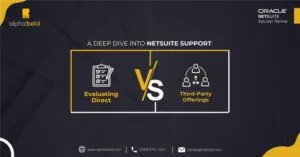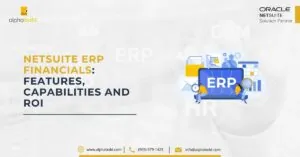Table of Contents
Introduction
In the dynamic world of business technology, ERP systems have emerged as essential tools to drive efficiency and innovation. Among the leaders in this space is the NetSuite ERP platform, celebrated for its comprehensive solutions tailored for businesses of all sizes. However, while many executives are drawn to its capabilities, understanding the true cost of a NetSuite ERP Implementation is paramount. It’s not just about the upfront expenses; the real picture is far more intricate. For top-tier decision-makers—CFOs, CIOs, COOs—grasping these costs is not merely a financial exercise; it’s about ensuring every dollar invested yields optimal returns. This guide delves deep into the economics of NetSuite ERP, aiming to equip executives with the clarity they need to discern both the tangible and hidden expenses and, more importantly, the potential ROI. These insights are crucial for making informed, strategic decisions as stewards of their organization’s financial health.
Understanding the Basics of NetSuite ERP
In today’s rapidly evolving business landscape, ERP systems are the backbone of many enterprises, propelling them towards streamlined operations and informed decision-making. One such solution that has consistently made its mark is NetSuite ERP.
What is NetSuite ERP?
NetSuite ERP is a comprehensive cloud-based Enterprise Resource Planning system that caters to businesses across various industries. Designed to provide an all-in-one solution, it encompasses functionalities ranging from financial management, CRM, and e-commerce to supply chain management. Its real-time data access and customizable dashboard ensure that businesses can track their operations, finances, and customer interactions seamlessly. Whether it’s about managing inventory, analyzing sales data, or automating financial entries, NetSuite offers a unified platform for all.
The Importance of ERP Systems in Modern Businesses:
Integrating ERP systems, like NetSuite, in modern businesses isn’t a luxury; it’s a necessity. Here’s why:
Unified Information: Unlike standalone databases or software where data remains siloed, ERP systems offer a consolidated view of business operations, reducing the hassle of managing multiple systems and ensuring that information is consistent across the board.
Improved Efficiency: Through automation of routine tasks and the reduction of manual entries, ERP systems significantly reduce the risk of errors, ensuring smooth and efficient business processes.
Data-Driven Decision Making: With real-time data at their fingertips, businesses can make informed decisions swiftly. This data-driven approach fosters proactive strategies, helping companies anticipate market shifts and customer preferences.
Scalability: As businesses grow and evolve, so do their operational needs. ERP systems like NetSuite are designed to be scalable, ensuring that as a business expands, the software adapts without causing disruptions.
Enhanced Customer Service: With integrated CRM functionalities, ERP systems provide insights into customer behavior and preferences, enabling businesses to tailor their offerings and interactions to enhance customer satisfaction.
In a nutshell, ERP systems are not just tools; they are catalysts that drive modern businesses toward growth, efficiency, and unparalleled customer satisfaction. With its vast array of functionalities, NetSuite ERP stands as a testament to the power and potential of integrated business solutions.
Read More about Cloud ERP Solution: The Best Way to Future-proof Businesses
The Trust Cost Analysis: Breaking It Down
A significant consideration for any enterprise-level solution is the investment required, not just in monetary terms but also in time, effort, and resources. As executives spearheading decisions, understanding the layered costs associated with a NetSuite ERP implementation is essential. Let’s peel back the layers and delve deep into what these expenses entail:
Implementation Costs:
The journey to implementing NetSuite ERP begins with specific initial costs that pave the way for a seamless operational transition.
Hardware and Software Requirements:
Even though NetSuite is a cloud-based solution, minimizing the need for extensive hardware, there might still be ancillary hardware requirements. These could range from upgraded workstations, servers for backup or redundancy, or even improved networking equipment to handle increased data flow. On the software front, while the core ERP system is part of the NetSuite package, additional modules or plugins might be necessary to cater to specific business needs. It’s also important to account for any third-party software integrations or tools that may need to be purchased to enhance or support your ERP environment.
Consultation Fees:
No two businesses are the same, which means off-the-shelf solutions rarely fit perfectly. Leveraging the expertise of NetSuite consultants is often a wise investment. With their deep knowledge of the platform, these experts can offer invaluable guidance on tailoring the ERP system to your organization’s unique requirements. Consultation fees can vary widely based on the complexity of the implementation, the consultant’s expertise, and the duration of the engagement.
Initial Setup and Configuration:
Setting up NetSuite ERP is not merely about software installation. It involves configuring the system to align with your business processes, setting user roles and permissions, migrating data from your existing systems, and ensuring everything runs smoothly. This process can be labor-intensive and may require both internal resources and external expertise. Factors influencing this cost include the size of your organization, the volume and complexity of data migration, and any custom configurations or integrations needed.
Understanding these foundational costs is the first step in understanding the investment landscape comprehensively. As we proceed, we’ll uncover other cost layers, allowing executives to make informed decisions fully understanding the financial implications of a NetSuite ERP implementation.
Ongoing Costs:
After the initial setup and implementation phase, businesses must know the recurrent expenses associated with operating and maintaining their NetSuite ERP system. While these costs may seem straightforward at first glance, understanding them in-depth ensures no surprises down the line. Let’s delve into these ongoing expenses:
NetSuite’s Licensing Fees:
NetSuite, like many ERP providers, operates on a subscription model. This means businesses pay licensing fees, typically annually or monthly. The cost here will depend on several factors:
- The number of users who need access to the system.
- The specific modules or functionalities your business requires.
- Any additional storage or specialized services that go beyond the basic package.
It’s essential to periodically review the licensing agreement, especially as your business grows and evolves. Scaling up might necessitate adjustments in the license, which could affect the cost. Anticipating growth and committing to a long-term contract can often result in considerable savings. However, this decision needs to be made carefully to prevent unjustified costs.
Maintenance and Upgrades:
The world of technology is perpetually in flux, and to remain competitive and efficient, your ERP system needs to keep pace. Maintenance fees often cover:
- Regular software updates to enhance functionalities or security.
- Upgrades to accommodate new features or modules.
- Periodic system optimizations to ensure peak performance.
Some maintenance costs might be included in the licensing fees, but it’s crucial to verify this. Also, when considering upgrades, factor in not just the software expenses but also potential costs associated with training staff on new features.
Support and Troubleshooting:
Even with the best systems, occasional hiccups are inevitable. Whether it’s a minor glitch, a user query, or a more significant issue, having robust support is essential. NetSuite often offers varying support levels, from basic assistance to 24/7 dedicated help. Costs here can vary based on:
- The support tier you choose.
- The speed of response time required.
- Whether on-site support or specialized assistance is needed.
Remember, while it might be tempting to opt for a lower support tier to save costs, the implications of extended downtimes or unresolved issues can be far more costly in terms of operations and reputation.
In summary, while the implementation phase brings its own expenses, the ongoing costs play a pivotal role in your NetSuite ERP system’s total cost of ownership. Being proactive in understanding and budgeting for these recurrent expenses ensures smooth operations and helps derive maximum value from your ERP investment.
Customize your NetSuite ERP for Maximum Efficiency!
Ready to tailor your NetSuite ERP to fit your unique business needs? Let AlphaBOLD's customization and integration services experts guide you.
Request a DemoHidden Costs:
While initial implementation and ongoing costs might be the most evident when budgeting for a NetSuite ERP system, hidden costs are another category of expenses that can sneak up on businesses. These are often overlooked or underestimated during the planning phase, but they can significantly impact the overall budget. Recognizing and preparing for these hidden costs ensures businesses aren’t caught off-guard during their ERP journey.
ERP Customization:
While NetSuite ERP offers a robust set of features out of the box, every organization has unique processes and requirements. Customizing the ERP to fit these specific needs is commonplace, but it’s also a potential cost center. Customizations can range from minor tweaks to extensive overhauls. Factors influencing the cost include:
- The complexity of the desired customization.
- Whether in-house IT can handle the customization or if external consultants are needed.
- The need for periodic updates or revisions to custom features.
- Testing of customizations before new upgrades are rolled out to ensure code will not break.
- Testing of core processes after upgrades are rolled out.
Integration with Other Systems:
Most organizations operate with a suite of software tools, from CRM systems to specialized inventory management tools. Ensuring that NetSuite ERP communicates seamlessly with these systems is essential for operational efficiency. Integrating can involve:
- Purchasing middleware or connectors.
- Investing in development time to create custom integrations.
- Ongoing maintenance costs to ensure integrations remain functional as all systems involved evolve.
Potential Costs of Disruptions During Transition:
Transitioning to a new ERP system isn’t always smooth. There can be hiccups, delays, or unforeseen challenges. These disruptions, even if temporary, can carry costs:
- Lost productivity as employees adapt to the new system or navigate unexpected challenges.
- Potential overtime costs if extended hours are needed to manage the transition.
- If there’s any downtime during the switch, there might be lost sales or compromised customer service.
Additionally, while not a direct monetary cost, the learning curve associated with a new ERP system can lead to slowed operations initially. Investing in comprehensive training can mitigate this, but it is another cost to consider.
In conclusion, the real cost of implementing and maintaining a NetSuite ERP system isn’t just about the software’s price tag or a consultant’s fees. It’s a holistic figure that includes both visible and hidden costs. By shedding light on these often-overlooked expenses, executives can ensure they’re fully prepared, financially and operationally, for a successful ERP transition.
Training Costs:
A successful NetSuite ERP implementation doesn’t end with the system going live. For businesses to genuinely harness the power and capabilities of the ERP system, ensuring that the team is well-versed and confident in using it is pivotal. This is where training comes into the picture. Adequate training not only ensures smooth operations but also helps in maximizing the ROI from the ERP system. However, while essential, training is accompanied by its set of costs.
Training Materials:
Depending on your organization’s scale and the ERP system’s complexity, you might need a variety of training materials. This includes user manuals, video tutorials, and interactive e-learning modules. Costs here can be influenced by:
- Whether you’re sourcing pre-made materials from NetSuite or creating customized resources.
- The quality and depth of materials. For instance, high-quality interactive content would be costlier than basic PDF manuals.
- The need for translations or adaptations for different departments or regional offices.
Onboarding Sessions for Employees:
Initial onboarding is crucial to ensure that employee’s transition smoothly to the new system. These sessions might involve:
- Live workshops or seminars might require hiring expert trainers or allocating internal resources.
- Costs associated with venue, equipment, or tools, especially if training large groups or multiple batches.
- Potential operational costs, as employees might need to take time off their regular tasks to attend these sessions.
Ongoing Training and Refresher Courses:
The business environment and the software landscape are continually evolving. New features might be added to the ERP, or there might be shifts in internal processes. To cater to these changes:
- Periodic refresher courses or advanced training sessions could be needed.
- For employees joining post the initial implementation, there would be a need for ongoing onboarding sessions.
As with the initial onboarding, costs can be influenced by the format (live sessions vs. e-learning), the expertise required, and the scale of training.
Furthermore, it’s crucial to consider the indirect costs associated with training. For instance, employees’ productivity might be reduced while they are being trained. Hence, there’s a potential opportunity cost linked with the training period.
While training costs might seem secondary compared to the hefty expenses of implementation or licensing, they’re an investment in the truest sense. Adequately trained employees can leverage the ERP system more effectively, leading to streamlined operations, reduced errors, and a more substantial ROI from the NetSuite ERP platform.

User Guide for NetSuite Pricing: All You Need to Know
Discover everything you need to know about NetSuite pricing with our comprehensive user guide. Get started today!
Learn More
Understanding the Total Cost of Ownership (TCO) of NetSuite ERP Implementation
When assessing the financial implications of an ERP system, focusing merely on the upfront price or even the apparent ongoing costs offers a skewed perspective. To truly grasp the financial commitment and potential return on such an investment, executives must factor in the Total Cost of Ownership (TCO). TCO provides a comprehensive and holistic view of both direct and indirect costs related to the system over its lifespan.
Combining All Costs to Get a Holistic View of the Investment:
The TCO isn’t just about summing up invoices or expenses; it’s an encompassing figure that considers:
- Direct Costs: These include the most evident expenses like licensing fees, implementation costs, maintenance, upgrades, and training expenses.
- Indirect Costs: Often overlooked, these might comprise potential operational downtimes during the transition, the learning curve associated with the new system or even costs tied to unforeseen challenges and hiccups.
- Future Costs: This considers projected costs for upgrades, system expansions, or ongoing training for new employees.
- Opportunity Costs: While harder to quantify, these are crucial. For instance, if the new ERP system streamlines operations, leading to increased efficiency and sales, the opportunity cost of not implementing the system would be the lost potential revenue.
Read more about NetSuite AR Automation: Streamline Cash Flow & Efficiency
Importance of TCO for Finance Executives:
For finance executives and decision-makers, the TCO is not just a number; it’s a tool. Here’s why:
Informed Decision Making: A clear picture of TCO allows executives to assess the viability of the ERP investment against the projected benefits. It provides a solid foundation for ROI calculations.
Budgeting and Forecasting: Knowing the TCO aids in accurate budget allocations, not just for the initial phase but for the entire lifecycle of the ERP system. It prevents unexpected financial strains and ensures smooth financial planning.
Benchmarking: By understanding the TCO, organizations can compare the costs and benefits of their NetSuite ERP system against industry benchmarks or alternate solutions, ensuring they’re getting the best value for their investment.
Strategic Planning: A transparent view of the TCO aids in strategic planning, allowing organizations to align their ERP investment with long-term business goals and growth trajectories.
In conclusion, the Total Cost of Ownership is a pivotal metric in the ERP decision-making process. By understanding and leveraging TCO, finance executives can ensure that their NetSuite ERP investment aligns with both immediate operational needs and long-term financial and strategic objectives.
Evaluating the Return on Investment (ROI) in NetSuite ERP System
One of the primary objectives behind any significant financial investment, especially in the realm of technology and infrastructure, is the expected ROI. By evaluating the ROI of your NetSuite ERP system, you can ensure that your investment is not only justifiable but also adds significant value to the organization. Here’s how to assess and understand the ROI from various angles:
Operational Efficiency:
One of the primary considerations is how NetSuite can streamline your team’s operations and reduce manual tasks. The following are examples of how an ERP system can limit your company’s overhead:
- Automation: NetSuite allows for the automation of numerous mundane tasks, such as data entry, order processing, and accounting, traditionally demanding hours of manual labor.
- Integrated Processes: With different modules speaking to each other seamlessly, data flows smoothly across departments, reducing bottlenecks and redundancy.
- Real-time Collaboration: Teams can work in tandem, accessing the data they need when needed, leading to quicker decision-making and response times.
ERP Benefits:
Another great consideration when calculating ROI, is the value of improved decision-making that stems from centralized, real-time data. With NetSuite, decision-makers have access to real-time data, offering timely and relevant insights. This means decisions are data-driven, reducing reliance on gut feelings or outdated information.
Enhanced Customer Experience:
From improved CRM functionalities to quicker response times, NetSuite empowers businesses to provide top-notch service, increasing customer loyalty and potential revenue upticks.
Inventory Management Improvements:
NetSuite’s inventory management module aids in optimizing stock levels, reducing holding costs, and minimizing stock-outs. This can lead to both cost savings and increased sales.
Break-even Analysis:
Costs are only one factor when calculating ROI. Finance executives should also bear the weight of assessing when benefits outweigh cost and how that can influence decision-making.
By charting out both the costs (from the TCO) and the projected benefits (both tangible, like sales, and intangible, like customer satisfaction), businesses can pinpoint when they can expect to break even on their NetSuite ERP investment. This gives a clear timeline for when the ERP system stops being an expense and becomes a profit center.
Cost Savings:
Lastly, it’s also important to identify and calculate where NetSuite can help your organization save significant expenditures. Below are key areas of saving that could be pertinent to your business:
- Reduced IT Infrastructure: With cloud-based functionalities, there’s a potential reduction in the costs associated with maintaining physical servers and related IT infrastructure.
- Efficiency Gains: As previously discussed, streamlined operations mean fewer person-hours wasted on redundant or manual tasks. This can lead to personnel cost savings or reallocation of resources to more strategic areas.
- Supply Chain Optimizations: With better inventory and order management, there are potential savings in both procurement and warehousing.
In wrapping up this section, it’s evident that the ROI from a NetSuite ERP system is multifaceted. While clear financial gains exist, the intangible benefits, from improved decision-making to enhanced customer experiences, contribute to long-term business growth and sustainability. For finance executives, monitoring quantifiable and qualitative returns ensures that the NetSuite ERP investment continually aligns with business objectives and market dynamics.
Tips for Working with NetSuite Consultants
Embarking on the journey of NetSuite ERP implementation is not just about purchasing a solution — it’s about embedding a transformative tool into the very fabric of your organization. Given the intricacies involved, collaborating with a NetSuite partner and their consultants can be a game-changer. These experts bring their nuanced understanding of the system and industry best practices, ensuring smoother transitions and more efficient implementations. Below, I want to discuss how to maximize the value of your relationship with these consultants.
The Value of Expert Advice During Implementation:
Bespoke Solutions: Every business has unique needs. Consultants can help tailor the NetSuite ERP system to align closely with your organization’s goals and operational nuances.
Avoiding Common Pitfalls: With their experience, consultants know common challenges and mistakes companies might encounter during implementation. Their guidance can help sidestep these pitfalls.
Change Management: ERP implementations bring about significant operational change beyond the technical side. Consultants often offer strategies to manage this transition, ensuring employee buy-in and minimizing disruption.
Training and Support: Top-tier consultants don’t just help with the initial setup; they provide training resources and ongoing support to ensure your team can harness the full power of the ERP system.
Reducing Costs Through Effective Consultancy:
Working with a NetSuite partner can also help reduce implementation costs by offering educational support and driving awareness around funding opportunities.
Efficient Implementation: Mistakes or inefficiencies during the setup process can be costly. A consultant ensures a streamlined implementation, potentially saving both time and money.
Leverage Best Practices: Instead of reinventing the wheel, leverage the consultants’ knowledge of best practices from similar industry implementations. This can lead to cost-effective solutions and quicker benefit realization.
Future-proofing: A good consultant can help set up the ERP in a scalable way, ensuring that as your business grows, you won’t face significant additional expenses to adjust the system.
Negotiating Licensing and Other Fees: Experienced consultants often have insights or connections that can lead to cost savings in licensing, maintenance, or other associated fees. They can guide you in choosing the right plan or package that offers the best value.
Key Tips for Working with Consultants:
If you’ve never worked with a software vendor and their partners, below are a few best practices and key tips for engaging a NetSuite partner that can come in handy:
Clear Communication: Be transparent about your needs, expectations, and any challenges you foresee. Regular check-ins and feedback loops can ensure the project stays on track.
Due Diligence: Not all consultants are created equal. Do thorough research, seek reviews, and perhaps even ask for case studies or references before choosing a consultant.
Engage Early: The earlier you bring a consultant on board, the smoother the planning and implementation process. They can offer insights that might influence initial decisions or strategies.
Ensure Post-implementation Support: Your relationship with the consultant shouldn’t end once the system goes live. Ensure they offer post-implementation support, at least for an initial period, to address any teething issues.
In conclusion, while investing in a NetSuite consultant might seem like an additional expense, their value — both in terms of a successful implementation and potential cost savings — can be substantial. Leveraging their expertise can differentiate between a good ERP experience and a great one.
How to Enhanced Performance with NetSuite Customization!
Empower your team with a NetSuite ERP Solution tailored to your requirements—Trust AlphaBOLD's services to drive efficiency and ROI.
Request a DemoConclusion
In the evolving landscape of business technology, implementing an ERP system like NetSuite is significant and transformative. As we’ve traversed through this guide, the recurring theme is evident: understanding NetSuite ERP implementation’s true cost and potential ROI isn’t a luxury — it’s a necessity.
From direct implementation expenses to the subtler, often overlooked hidden costs, a comprehensive analysis paints a full picture, allowing for foresight and proactive planning. However, it’s not just about the expenditure. The tangible and intangible potential returns can position a business for streamlined operations, improved customer experiences, and substantial growth.
To our esteemed executives — the CFOs, CIOs, COOs, and other financial leaders — the onus is clear. As stewards of your organization’s financial health, diving deep into a detailed cost analysis isn’t just about due diligence; it’s about paving the way for strategic decisions that could shape the trajectory of your business. With the right insights, expertise, and perhaps a touch of expert consultancy, the path to a successful NetSuite ERP implementation, replete with robust returns, awaits.
In closing, may your journey with NetSuite be one of enlightenment, efficiency, and exponential growth. Make every dollar count, but more importantly, ensure that every decision is informed, intentional, and in the best interest of your organization’s future.
Explore Recent Blog Posts









